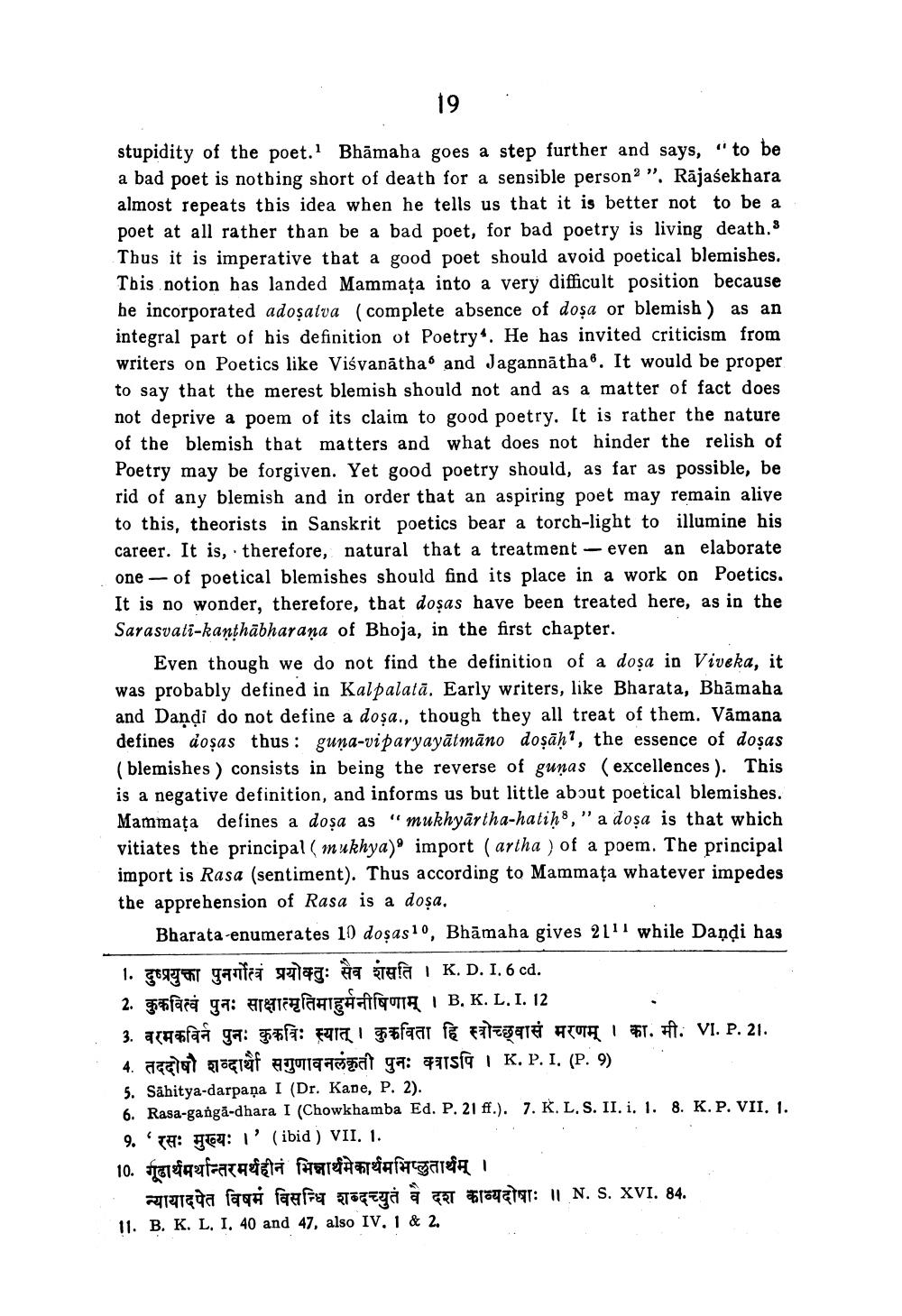________________ . 19 stupidity of the poet. Bhamaha goes a step further and says, "to be a bad poet is notbing short of death for a sensible persona". Rajasekhara almost repeats this idea when he tells us that it is better not to be a poet at all rather than be a bad poet, for bad poetry is living death, Thus it is imperative that a good poet should avoid poetical blemishes. Tbis notion has landed Mammata into a very difficult position because he incorporated adosalva (complete absence of dosa or blemish ) as an integral part of his definition of Poetry. He has invited criticism from writers on Poetics like Visvanatha and Jagannatha 6. It would be proper to say that the merest blemish should not and as a matter of fact does not deprive a poem of its claim to good poetry. It is rather the nature of the blemish that matters and what does not hinder the relish of Poetry may be forgiven. Yet good poetry should, as far as possible, be rid of any blemish and in order that an aspiring poet may remain alive to this, theorists in Sanskrit poetics bear a torch-light to illumine his career. It is, therefore, natural that a treatment - even an elaborate one - of poetical blemishes should find its place in a work on Poetics. It is no wonder, therefore, that dosas have been treated here, as in the Sarasvati-kanthabharana of Bhoja, in the first chapter. Even though we do not find the definition of a dosa in Viveka, it was probably defined in Kalpalata. Early writers, like Bharata, Bhamaha and Dandi do not define a dosa., though they all treat of them. Vamana defines dosas thus : guna-viparyayatmano dosah?, the essence of dosas ( blemishes ) consists in being the reverse of gunas (excellences). This is a negative definition, and informs us but little about poetical blemishes. Mammata defines a dosa as "mukhyartha-hatih," a dosa is that which vitiates the principal (mukhya)' import (artha ) of a poem. The principal import is Rasa (sentiment). Thus according to Mammata whatever impedes the apprehension of Rasa is a dosa. Bharata-enumerates 10 dosas10, Bhamaha gives 2111 while Danni has 1. goaga garitea tag: # stala K. D. 1. 6 cd. 2. #faca ga: arqlahigaa | B, K. L. I. 12 3. acuxfa a gat: sofa: Fara i gofaar le FTIEGTISH #TOTAL 1 1. 1. VI. P. 21. 4. aqalat yograf ago19a53at ga: 9715 | K. P. I. (P. 9) 5. Sahitya-darpana I (Dr. Kane, P. 2). 6. Rasa-ganga-dhara I (Chowkhamba Ed. P. 21 ff.). 7. K.L. S. II. i. 1. 8. K.P. VII. 1. 9. 6: ' (ibid) VII. 1. 10. गूढार्थमर्थान्तरमर्थहीनं भिन्नार्थमेकार्थमभिप्लुतार्थम् / zlarda faqi faafia toqayd a chat #179&tat: 11 N. S. XVI. 84. 11. B. K. L. I. 40 and 47, also IV. 1 & 2.




